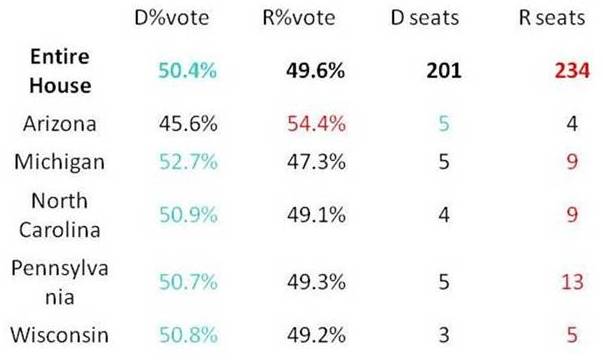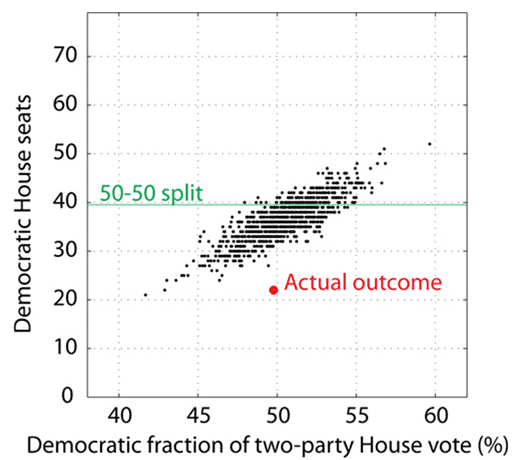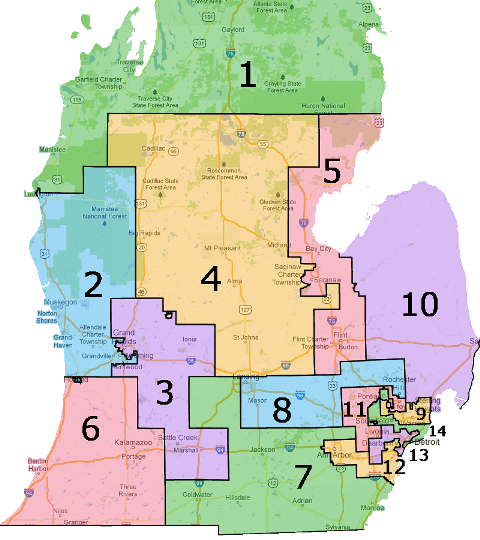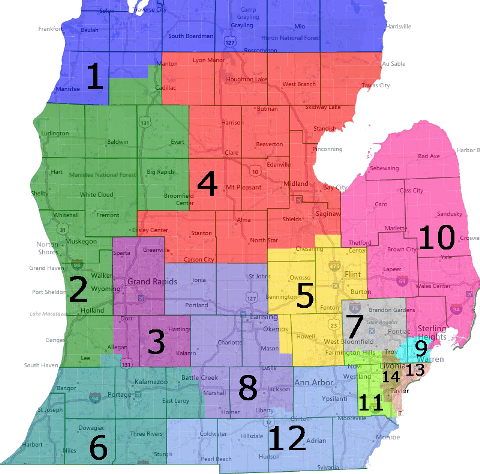Gerrymandering Michigan
I have been somewhat of a thorn in the Michigan Republican’s side as I know about the PPACA, can explain how it will benefit Michigan, can show by the Governor’s own report it will not cost Michigan anything up to 2027/28, and I can refute the arguments using economic data on other topics. I have been told other people are learning from my comments. Most recently, I was in a newspaper discussion with the head of the Livingston County, Michigan Republicans over the redistricting of Michigan resulting from the 2010 census. Many believe the Republicans took advantage of it due to the loss of one Congressional Representative, also the law to redistrict, and gained in swing states such as Michigan for the Republicans. ~54% of the state voted (2012 – NYT) Democrat and the state ended up with 35% of its US House Reps coming from the Democratic Party. Along the way a large group of voters are disenfranchised.
Livingston County Repub Rep Dan: What Jack Lessenberry doesn’t mention is that the law restricts the number of county and municipal breaks with redistricting. In addition, there is Voting Right Act provisions to protect minorities. Detroit votes 97-3%D. Unless you break the APOL laws or dilute the black vote, you are not getting the type of map he advocates. The maps are not a result due to gerrymandering (and I can draw much nastier maps against the D’s), but due to democrats living in concentrated areas. Detroit. Southern Oakland. Southern Macomb. Downriver. Ann Arbor/Ypsi. Flint. Lansing. Grand Rapids City. Muskegon City. Saginaw (city). Bay City. Marquette. That covers most of it. In Joe Hune’s case, he actually took a much tougher district than his old one although the partisan makeup doesn’t change much. Joe did very well in the swing areas of Shiawassee County and has new territory in Washtenaw County. He’s working hard to gain support there as well, particularly the Manchester area. What is Behind Hune’s Change of Heart?
Me to Dan: I have no love lost for “I am sick to my stomach” Michigan State Senator Joe Hune at the Medicaid expansion. I will leave it at such. I have not looked into this in much detail and I was posting a link for the article, as the article link did not work and nothing more than such.
Since you have laid this out in such detail, I will look at what you say for greater clarity. Thanks for your replay Dan.
Dan: Bill – Historically, there has not been the same partisan divide by geography. Democrats used to win in rural areas. The moderate Terry Browns, Joel Sheltrowns, and even Jim Barcias (who was from Bay City but had rural support) are increasingly rare. Democrats don’t compete there much anymore. (unless Bay City outvotes the rural areas). Statewide votes don’t matter except in statewide races. Most of the Obama margin came from Detroit, Flint, and the inner ring suburbs. The last time the dems had the majority, they had six up north state house districts. They lost four of them and were unable to gain them back. There was a seventh they had before they had the majority they never got back after 2004. They also had two thumb districts (even Sanilac County). They lost both but gained one back because it was Terry Brown. If you go back to the 90’s, they even had districts in Lapeer County. Most of that has been wiped out as candidates voted with leadership.
Location vote is what matters for congress, state rep, and state senate, and the state is naturally “gerrymandered” because of self segregation of voters. Obama won 20 counties with 7 or so swing counties (like Shiawassee which would vote for Obama, but also Joe Hune). Most of the base areas within those counties are concentrated. Combine that with Voting Rights Act requirements in areas for black majorities, and you’re not going to have an easy time to get a majority no matter what the results are statewide.
Detroit has 2 based Congressional, 5 based State Senate seats. and 10 based State Rep seats. Those are all 80%+D Districts with some over 90%. The D vote in Oakland is concentrated in two areas. Pontiac and a stretch roughly from about Haggerty East to Dequindre and South of around 14 Mile. The D vote in Macomb is McClemens, Eastern Clinton Twp, South Warren, Roseville, CenterLine, and Eastpointe with some competitiveness in North Warren and Sterling Heights. Mostly 60% D districts with some 80%+. Most of that is concentrated as well. In Genesee County it’s the Northern and Eastern parts of the county (65%-80%+) In Washtenaw, it’s East of Dexter and South of Joy Road. That’s 70%+.
It’s tough to get a majority of districts with most of the base voters only living in a few areas.
Me again: The 2014 election is just around the corner and the politics of it are heating up. I have been somewhat of a thorn in the Republican’s side as I know about the PPACA, can explain how it will benefit Michigan, can show by the Governor’s own report it will not cost Michigan anything till 2027/28, and I can refute other arguments using economic data on topics. I have been told other people are learning from my comments.
For the “the Dems would also do it crowd,” the Michigan State Senate has been in control of the Repubs since 1983 and the House for 14 year those same years making it impossible for the Dems to have done such. Both in 2001 and 2010, the Republicans have controlled both the Michigan House and the Senate. Michigan has leaned towards the Democrats in each Presidential election. Is it any surprise, Michigan has more Repub Reps in Congress as opposed to Dems?
In Michigan, it does not appear to be possible for a Republican to be concerned about minority rights and how Democrats live unless there is an advantage in doing so. There is a definite hatred for Detroit even thoug the Detroit metro-area provides 52% of the state’s GDP. Was there a national and local advantage for Republicans to redistrict as they did in 2001 and 2012. I think there is, Michigan is one of six swing states for National elections which carries over into state elections and controlling districting. The Koch Bros through AFP are pouring $millions into Michigan.
So how would Michigan look, if Michigan districts were cast in a non-partisan and/0r unbiased mannner? For that answer, I had to turn to several sources who had used 2010 census results to redistrict according to the law.
Was there an advantage given to the Repubs after the most recent redistricting? Sam Wang at Princeton Election Consortium did the investigative work (Gerrymanders, Part 1: Busting the both-sides-do-it myth) from which I will benefit. It would appear the swing states have taken advantage and moved decisively Republican with the redrawing of districts and even though the state voting has been one way (mostly Democratic – blue) or the other (Republican – red). As you can see for Michigan, the split was 52.7% Democrats and 47.3% Republican and yet Michigan sent more Republicans to Washington than Democrats besides maintaining control of both the state Senate and the House. Michigan had the widest margin of votes (AZ – black is court ordered).
In summary Sam Wang states: “My analysis indicates that redistricting has given Republicans an advantage of about 1.2% in national popular vote margin compared with pre-2010. In a close national Congressional race, which we have this year, this translates to an advantage of 13 seats. The effect is more than I was expecting. (October 4th, 2012).” Now play this down to the state legislatures where Michigan has virtually eliminated disclosure laws for the funding of candidates and the Repub controlled State Supreme Court gets to decide.
Previously Dan said it would make no difference how districts are configured to the outcome of Congressional Reps. Sam Wang says gerrymandering does make a difference on a national level and suggests it also has an impact filtering down to the state level. As you can see the impact above in the number of seats garnered in swing states and again in a before and after redistricting scenario below.
Before and After Redistricting b
Looks at an alternate view of redistricting and its impact utilizing a scatter plot to address the otal effect in six states: PA, OH, NC, MI, VA, and IN.
“If redistricting had not been accomplished for these six states by the Republicans, the net effect would have been along the lines of the scatter chart above. Redistricting produced the “Actual Outcome” as shown giving way to a Republican majority. ” Republican-controlled redistricting led to a swing in margin of at least* 26 seats, almost as large as the 31-seat majority of the new Congress.” The House Congressional Repubs would still have a majority; but, it would be much smaller.
Dan also said: “Location vote is what matters for congress, state rep, and state senate, and the state is naturally “gerrymandered” because of self segregation of voters.” In other words, Dems are urbanites as compared to their country cousins the Repubs. Now why would Dan make such a general statement?
Right here at home at the University of Michigan, one Political Science Prof, Jowei Chen at the University of Michigan and another Jonathan Rodden from Stanford simulated the differences between political gerrymandering and geographical gerrymandering.
What they found is geography makes a bigger difference in the states they studied rather than partisanship. However the study did not include Michigan. Michigan is a swing state and would have given back 3 Congressional Reps if the districts had been drawn differently. < a href=” http://www.huffingtonpost.com/2014/03/31/gop-gerrymandering_n_5060834.html” target=”_blank”>Political scientist Michael McDonald at George Mason University commented “living patterns only matter if districts are required to be geographically compact and even then it is not hard to draw maps that favor Democrats.
Congressional districts are large, averaging more than 700,000 people. That makes it easy in most cities to combine urban, suburban and rural voters within a compact district.
If Democrats controlled the process, they could draw pretty much whatever they wanted to draw. It is just who controls the pen.”
Which brings us to the final point, what would those Michigan Districts look like if redistricted to reflect the popular vote? I emailed Sam Wang to get his data and so far, no luck. Sawolf at Huffington does a nice job of redoing the Districts What if We Had Non-Gerrymandered Redistricting Nationwide? and here” Republicans STOLE the House! Here’s What YOU Can DO to Fight Back!.
Gerrymandered Michigan:
Michigan Data Before.
Governor Snyder signed the legislation making this map the law in Michigan. As Huffingston’s Sawolf points out “Detroit is a contorted mess.” 2008 President column shows how each District went (Obama or McCain). PVI is Party (D or R) plus percentage of political leaning. The Repub gerrymandered map “packs Democrats into 4 districts, leaving Dems 5 total while Republicans and Mitt Romney won 9 of the state’s 14 districts in a state where Barack Obama won by nearly 10%.
Non-Gerrymandered Michigan:
Michigan Data After.
I live in Michigan and in a strongly Repub-controlled county. I have also served as a Township appointed official in the same county as appointed by a Repub Township Supervisor who I have voted for as he maintained the Township through various measures such as raising taxes. Rare in Michigan, we are fiscally solvent. as a Township. The striking difference in the maps is the neatness of the later especially in Detroit. As Huffington’s Sawolf points out, “Had this map been in use for the 2012 elections, the Dems might have won three more districts, the 7th, 8th, and 11th.
Other possible results from this map if it was in place for the 2014 midterms? The Dems could pick up the Bentivolio (R)’s 11th district as it shifts ~ 7% to the left. Congressman Mike Rogers (R)’s 8th district becomes a possibility as Lansing is not compromised and there is a 6% shift leftward. State Senate Minority Leader Gretchen Whitmer (D) could be in a sound position to run for Cong. Rep if she decided not to run for Governor or Attorney General.
What this would also mean for Michigan is much of the State House would come back to Dems. Then too, this is a topic for a future post.








More interesting question is whether gerrymandering has strengthened the fringes of each “party.”
J:
I am not sure. I do see am emergence of radicals who have pushed any sense of bipartisanship well into the back of any type of agreement. There just isn’t any. It is my way or the highway thought process by Tea-Baggers and Repubs. It would have been good if Obama drew the line in the sand after his election in 2012 and broke their backs with the strength he had gained. He just did not do it and the Repubs do not take anything Dems do seriously.